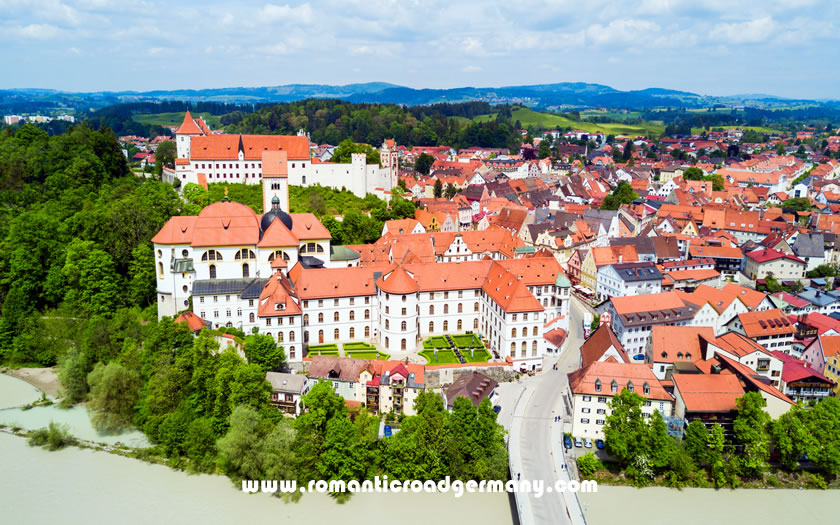

Füssen is an attractive Bavarian town at the foot of the Alps near the Austrian border and with the Lech river running through it.
The town is the southern end (or beginning) of the Romantic Road tourist route and also makes a good stop-off point on the way along the German Alpine Road.
And it is a good location to rest up after travelling the Romantic Road and maybe spend a few days relaxing and hiking in the Bavarian Alps.
The Royal castles of King Ludwig II - the world-famous Neuschwanstein castle and the less well-known Hohenschwangau castle - are just a short journey away near the neighbouring village of Schwangau.
Lake Forggensee or the cable car ride up Tegelberg mountain are also slightly less historical and more active options for a day trip from the town.

But Füssen's old town itself has plenty of attractions, with the famous castle (the 'High Castle', once the residence of the Prince Bishops of Augsburg and now housing a selection of art and sculpture from the State Picture Collection of Bavaria) and the former Benedictine monastery of St Mang, where visitors can now find the Museum der Stadt Füssen (the town museum).
The closest airport to Füssen is the regional airport at Memmingen, followed by the trip over the border into the Austrian Tyrol and Innsbruck Airport.
Distance to Allgäu (Memmingen) Airport: 78km
Distance to Innsbruck Airport: 107km
Distance to Bodensee (Friedrichshafen) Airport: 122km
Distance to Munich Airport: 161km
Memmingen has grown in terms of the number of destinations that it serves and the public transport connections are far better than they once were. As with most locations in southern Germany, the choice of flights and the transport options from Munich mean it should come into serious consideration.
The railway station at Füssen is on the edge of the old town centre. Füssen is at the end of a branch line to Biessenhofen. Regional services to Munich and Augsburg connect through this station with some not requiring any change of train.
If you know when you are planning to go but haven't decided on accommodation, then use the map below to get an idea of which properties are available and to compare prices during the period you wish to travel.
Enter your proposed dates and use the '+' to zoom in on a location and reveal more properties. Click on the price above a property to see more information.
(Please note that this selection will also include some guesthouses, pensions and self-catering apartments for those who are interested in that form of accommodation!)
Füssen's strategic position at the entrance to the mountains and on the Lech means that it must have been an important site in pre-history.
It is known, for example, that the area around the town and the lake was cultivated in these times.
However the roots of the town really date back to Roman days and the installation of a Roman way-station and fort called Foetibus on the Via Claudia Augusta, a trading route which arrived from Italy and headed north towards Augsburg. The term Füssen originates much later from the German of the 12th century.
The saint who features in much of the town's history, St Magnus or St Mang (in local dialect), is popularly thought to have arrived in this area in the 8th century from Switzerland and the evangelical centre at St Gallen (much about the life and history of St Magnus is unsure). The monastery or abbey was built on the site of what was supposed to be his cell during the days when he lived.

The former site of the Roman camp was used, understandably considering its commanding position, as a fortification by the Prince-Bishops of Augsburg, who held rights to this area under the control of the Bavarian rulers. The current look of the High Castle above the town dates back to the 15th and 16th centuries.
Commercially, the town lived from trade for many centuries, as a transhipment point for goods which were travelling over the Alps and which were scheduled to travel on the rafts which plied their way down the River Lech.
It was also an important centre for the manufacture of lutes - an instrument which was popular in the Middle Ages through to the Baroque period.
Nowadays, Füssen is known for its tourism. The town is part of the Königswinkel (the "Kings' Corner") along with the neighbouring settlements of Schwangau and Pfronten. The phrase refers to the many castles and ruins in the area - especially the tourist magnets of Neuschwanstein Castle and the neighbouring Hohenschwangau Castle.
And, of course, the Romantic Road along with the surrounding mountain scenery and the sports on offer, help to swell the increasing number of visitors to this area.
The Town Museum is located in the former Benedictine Abbey of St Mang in the heart of the old town.
The building is reputed to date from monastic quarters which were founded by St Magnus, a follower of the evangelising monks from Ireland who came to Central Europe in the 6th or 7th century.
The actual buildings consist of the Basilica, the Anna Chapel and the former monastery. The town museum is entered around the corner from the religious buildings.
A selection of the Bavarian State Picture Collection is displayed in one of the wings of the Füssen High Castle. This fortification originally belonged to the Prince-Bishops of Augsburg and its imposing walls can be seen from most of the town.
The collection of paintings and sculptures offers works from the Middle Ages in this particular area of the Allgäu and Swabia, as well as allowing a visit to some of the impressive historic rooms.
The Füssen Tourist Office is situated outside the pedestrian
area on the main road which goes around the historic centre. It is
open Mon-Sat year round, and on Sundays and public holidays in the
summer months.
Website: www.tourismus-fuessen.de